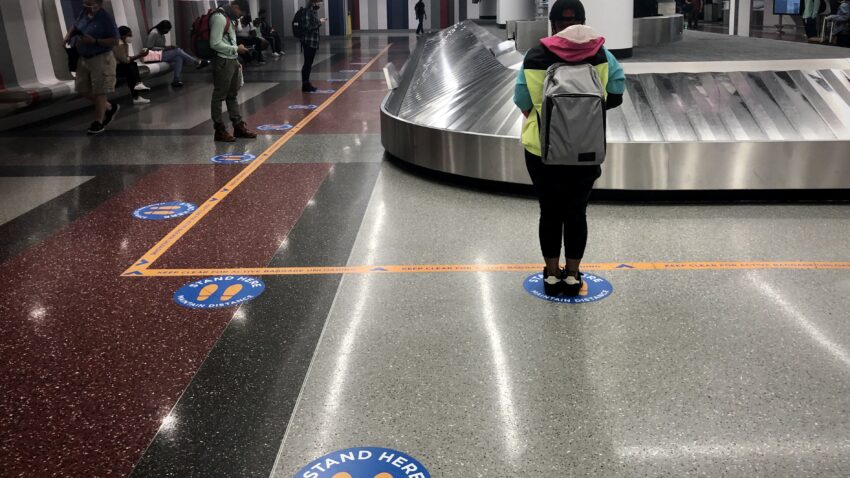Dr. Jeremy Faust, an emergency room physician at Brigham and Women’s Hospital, is pushing back against claims and worries that the coronavirus-spurred economic shutdowns in the spring resulted in a rise in suicides.
The doctor shared his findings for the state of Massachusetts — that suicide deaths did not increase during the state’s lockdown in March, April, and May — on Twitter and wrote about what can be learned from the data in an opinion piece published by the Washington Post. The rates in Massachusetts did not change from expected numbers, neither rising nor falling during the spring.
“The notion that suicide deaths increased during this period here is simply inaccurate, we now can confidently say,” he wrote Tuesday.
Faust said he and his colleagues weren’t surprised by the finding, but what remains unclear is whether the number of suicides has gone up or not in the time since May.
“If it has, will it be worse in states with longer shutdown periods (e.g. Massachusetts) or in places that opened sooner and had a far worse past few months both in terms of covid and the economy? Remains to be seen,” he wrote. “For now, we can say that people claiming a huge increase in suicides was occurring during the shutdown here were basically just *making that up*. We have to be data driven, not driven by a “gee whiz, that sounds right, so it must be!” mentality.”
Here’s a briefing summarizing our findings in the @nytimes: https://t.co/mZyuFKbPSU
And a direct link to the new research: https://t.co/IY53iyOonu
Let’s unpack this 2/
— Jeremy Faust MD MS (ER physician) (@jeremyfaust) October 20, 2020
This is work I did with @hmkyale Sejal Shah and a great stats team at @Yale, Chengan Du, Shu-Xia Li, and Zhenqiu Lin.
A great @BrighamWomens @harvardmed / @YaleMed collaboration, with the help of the MA Department of Health.
— Jeremy Faust MD MS (ER physician) (@jeremyfaust) October 20, 2020
The gray zone in the figure is the range of expected suicide deaths that would have been expected to occur during 2020, based on 2015-2019 trends.
As you can see, we were well within normal ranges (why January 2020 was a bit worse than usual, we don’t know). pic.twitter.com/QVx9J2kfWI
— Jeremy Faust MD MS (ER physician) (@jeremyfaust) October 20, 2020
We do not know if suicides will have gone up after or since.
Data are not yet complete enough.
But we are not surprised by this finding.
What *could drive an uptick in suicides would be downstream economic problems in the absence of support/stimulus/aid.
But…
— Jeremy Faust MD MS (ER physician) (@jeremyfaust) October 20, 2020
For now, we can say that people claiming a huge increase in suicides was occurring during the shutdown here were basically just *making that up*
We have to be data driven, not driven by a “gee whiz, that sounds right, so it must be!” mentality.
— Jeremy Faust MD MS (ER physician) (@jeremyfaust) October 20, 2020
Lastly, again, if you or anyone you know is at risk or having mental health concerns, please call the National Suicide Prevention Lifeline at 800-273-8255.
Be well, everyone.
/fin.
— Jeremy Faust MD MS (ER physician) (@jeremyfaust) October 20, 2020
During the final presidential debate between President Donald Trump and his Democratic challenger Joe Biden, in response to a question about reopening schools that referenced Boston’s plans, the Republican leader again pushed a link between the economic shutdown and Americans taking their own lives — an argument he has presented repeatedly since the start of the pandemic.
Faust reacted to the moment on Twitter on Thursday night.
“Depression is a problem but it is not as bad as DEATH,” he said. “Suicides during lockdowns DID NOT HAPPEN here, one of the longest shutdowns in the United States.”
Depression is a problem but it is not as bad as DEATH.
Suicides during lockdowns DID NOT HAPPEN here, one of the longest shutdowns in the United States.
— Jeremy Faust MD MS (ER physician) (@jeremyfaust) October 23, 2020
There is NOT data that people are committing suicide during lockdowns.
Trump is lying about caring about mental health in order to advocate herd immunity.
It is SICKENING. https://t.co/IY53iyOonu
— Jeremy Faust MD MS (ER physician) (@jeremyfaust) October 23, 2020
In his op-ed, Faust stressed that studying the effects of stay-at-home advisories is in “its infancy,” and that some worries about the measures will likely result in being overblown, while others may not.
“There are legitimate questions to be raised about the pandemic’s toll on mental health,” he wrote. “Some of the impact may have more to do with the continuing inability to control the virus, and with the ensuing economic fallout, than with Americans’ staying home for weeks and even months in the spring. That said, a rise in suicides or other suffering resulting from temporary stay-home advisories is neither guaranteed nor inevitable.”
In Massachusetts, more than 9,500 people have died from COVID-19 since the pandemic began, with more than 143,900 confirmed cases of the virus.
Get Boston.com’s e-mail alerts:
Sign up and receive coronavirus news and breaking updates, from our newsroom to your inbox.



















